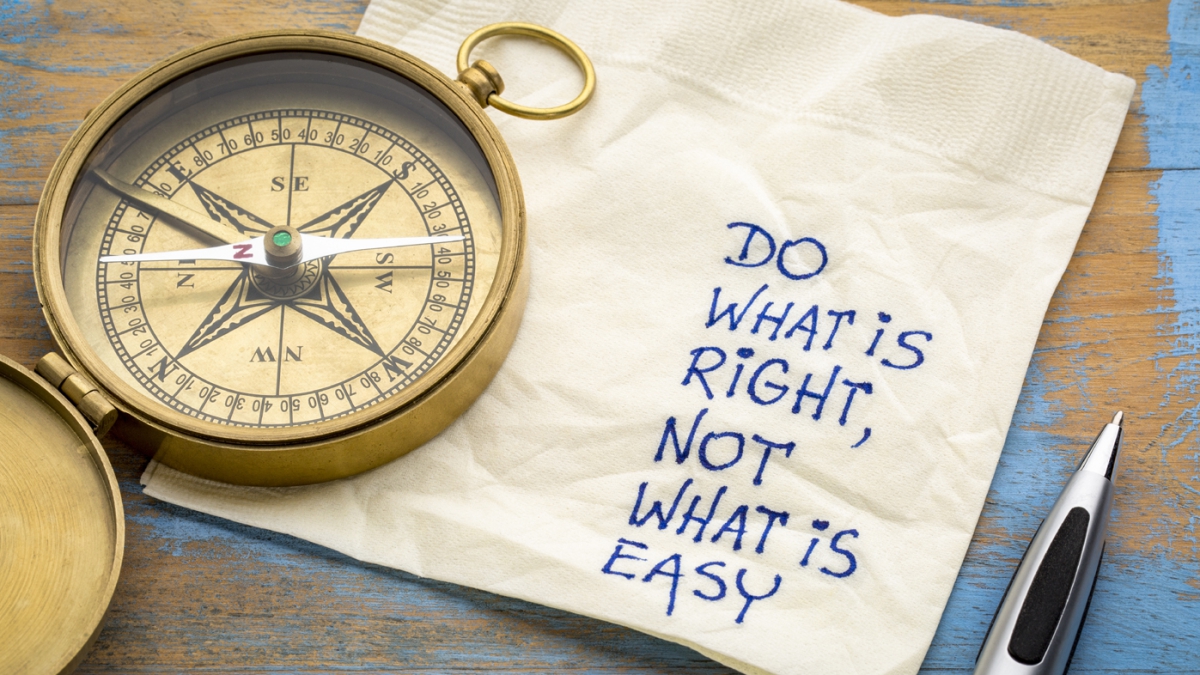Do we have good morals?

Having good morals is a prime responsibility
Character formation is the most important aspect of Islamic personality. That is why we can see that the goal of Islam - of the concepts, worships and teachings relating to values, attitudes, morals and behavior is to create an Islamic personality. The Prophet has stated the foremost purpose of being sent down in this world and the method of his mission in the following words.
"I have been sent for the purpose of perfecting good morals." Inculcating good manners among the people and purifying them as per the noble teachings of Islam was the ultimate responsibility given to the Prophet and after him, the believers are to set an ideal example of Islamic Character before the public.
The Qur'an has made it very clear that following the footsteps of the Prophet in the high esteemed character and morals is a vital aspect of being an example Muslim. God says: "And by the mercy of God, you dealt with them gently and had you been severe and harsh-hearted, they would have broken away from about you. So pass over (their faults) ask (God's) forgiveness for them, and consult them in the affair. Then when you have taken a decision, put your trust in God, certainly God loves those who put their trust (in God)" (Al-Qur'an 3:159)
So a Muslim must possess the noble character which attracts people to him. When God sent Prophet Moses and Haroon to Pharaoh He said to them: "You tell him soft words." He may accept the guidance and fear God. It is natural that people like those who speak gently and decently and hate those who are harsh and hard in behavior.
The great message which has left an indelible impression on the history was the unique personality of Prophet Mohammad . God has praised him. "And verily, you O Mohammad are on an exalted character" (Al-Qur'an 68:4) The Prophet practically proved how to fulfill this noble goal to his companions. The purpose of which was nothing else but to strengthen the moral character of people so that the world of beauty and perfection may be illuminated before their eyes and they may try to achieve it consciously and with knowledge. The Qur'an says: "verily as for those who believe and do righteous deeds, certainly we shall not suffer to be lost the reward of anyone who does his righteous deeds in the most perfect manner" (Al-Qur'an 18:30).
Treat others with generosity
Islamic character is a divine character. It is to treat others with the same generosity and charity as Almighty God shows to man. Islam has set the norms in this pattern by saying "If you are merciful, forgiving and magnanimous, God is the forgiving, the merciful. That is to say that we are supposed to adopt a posture similar to God's in our dealings with others. God forgives people their mistakes and does not deprive them of His mercies because of their errors. Thus magnanimity becomes the cardinal principle of Islamic Character.
Helpfulness and benevolence towards others
The highest standard of Islamic character entails helpfulness and benevolence towards others. The very existence of a believer is beneficial to others since Islam teaches the lowest branch of belief is removing the disturbance from the way. So the believer passing through a way is useful to others. His words are useful to every one. Because Islam has taught "whoever believes in God and the life hereafter, let him tell good things to keep quiet."
Patience
Patience is another ingredient which makes the believers character commendable and appreciable. It has been taught that patience is one half of faith. Marvelous examples of patience on various occasions can be drawn from the life of the Prophet .
Sincerity, honesty, humility, justice, patience, straightforwardness, keeping a promise ...
Islamic ethics and moral as stated in the Holy Qur'an and Sunnah embrace the consideration of all those moral excellencies known to the world, such as sincerity, honesty, humility, justice, patience, straightforwardness, keeping promise, charity, meekness, politeness, forgiveness, goodness, courage, veracity, sympathy, tolerance, decency, cooperation and other ethical instruments and rules of conduct recommended and upheld by Islam. A luminous feature of the Islamic system of life is that it teaches comprehensive manners to all mankind with mercy, sympathy and consideration.
Speak the truth
The first among the deeds which tops the list of good manners is to speak the truth and be steadfast in it regardless of its consequences. The Prophet teaches: "The best of crusades is to speak the truth before a tyrant ruler. 'Speak the truth no matter how bitter it may be.' Keep away from ill thinking because ill thinking is the greatest falsehood."
Avoid Jealousy, backbiting, falsehood ...
By prohibiting jealous, backbiting, falsehood, wickedness and all other harmful things Islam arranges the ground steady for emulating divine principles of Islamic character which provide a peaceful living in this world and the hereafter. The major criterion in Islamic living is in the eternal words of The Prophet that "Actions rest on motives."
What are Good Manners?
Good Manners mean the commission of those virtuous deeds by which human perfection is achieved which entitles a human being, in its true senses to be referred to as the best of creation. The effect of adopting these manners, propounded by Islam is that humankind receives tranquility, peace, harmony, happiness, love, affection, justice, equality and whatever a human being desire for a healthy and peaceful living.
Responsibility towards God and responsibility towards fellow beings
All these teachings are formed considering the responsibility entrusted upon human beings. It is clearly mentioned that humankind has a dual responsibility to perform. One is in relation to himself and his obligations to the Creator, the other one is in relation to his external world and commitments to the creatures and fellow beings.
The former has to express in a process of self-development, physical, intellectual and spiritual. In other words, man's responsibility is to invite to God, so to say, exercise His right to dwell in the individual and urge him to use properly the balance set in his nature. The idea is in conformity with the Quranic exhortation. "O you who believed if you help (the cause of) God, He will help you and set your feet firm" (Al-Qur'an 47:7).
Obligations to one's self and obligations to society
The other responsibility lies in developing social consciousness and in caring for the welfare of others. The two terms may as well be styled as "Obligations to one's self" and "obligations to society." The two types of responsibilities are not to be regarded as exclusive. They are merely two faces of one and the same attitude towards life, of the same activity proceeding from it and signify the character of the mind one has to develop. It is this mind which matters in determining responsibility for every human action.
Sayyid Abul Ala Mawdudi (September 25, 1903 - September 22, 1979), was a Pakistani journalist, theologian, Muslim revivalist leader and political philosopher, and a major 20th-century Islamic thinker.
Views: 16654
Related Suggestions
the editor should however be more vigilant with typographical errors

















